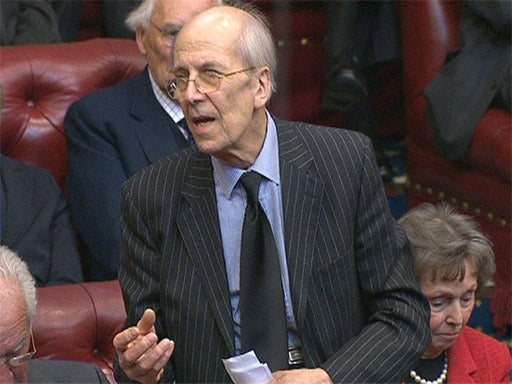Lord Tebbit leads the tributes to Margaret Thatcher – but Lord Howe stays silent
Thatcher's ministers used the Lords debate to praise their former boss, with one notable exception

Their hair, if they have any, is greyer and their skin wrinklier, but old Thatcherite warriors in the House of Lords have not forgotten what it was like to be at Margaret Thatcher's side. And one, at least, has not forgiven those whom he accuses of betraying her. Norman Tebbit, the former Tory Party chairman who stayed loyal to her to the end, paid a ringing tribute to the way she stood up to the trade unions at home and Communism on the world stage, and to her kindness to him after an IRA bomb ripped through the Grand Hotel in Brighton, where senior Conservatives were staying for their annual conference in 1984.
Lord Tebbit had to be dragged from the rubble of the hotel, in front of television cameras, and his wife Margaret was permanently crippled. "I cannot think of a precedent for a Secretary of State remaining in office as Secretary of State although absent from the Cabinet for over three months. She allowed me to run my office from my hospital bed," he told his fellow peers. But there was a sting at the end of his speech. "She, of course, was brought down in the end, not by the electorates but by her colleagues," he said.
He added: "Because of the commitments I made to my wife, I did not feel able either to continue in government in 1987 or to return to government when she asked me too, and I left her, I fear, to the mercy of her friends. That I do regret."
Two of the "friends" who Thatcherite diehards blame for her fall were on the front bench listening – though Lord Heseltine, often seen as the main culprit, was absent. Sir Geoffrey Howe, whose resignation from the cabinet triggered the events that brought her down, sat in silence and left soon afterwards without speaking.
John Wakeham, the Chief Whip who arranged for her to be confronted by the remaining members her Cabinet one by one, so that they could tell her that her time was up, was also there. He spoke immediately after Lord Tebbit, though he avoided mentioning the drama of her downfall in a downbeat tribute, which included the perhaps surprising claim that the former Prime Minister had a lively sense of humour.
Unusually, the Lords debate was frequently more interesting than the simultaneous one in the Commons, because it featured so many speakers who had dealt directly with Mrs Thatcher during the 1980s. They included the former Cabinet Secretary, William Armstrong, who recalled Mrs Thatcher's first meeting with France's Socialist President Francois Mitterand, which Armstrong feared would go badly. "As we walked back, I said to the Prime Minister, I suppose with some surprise, 'That visit went rather well, didn't it, Prime Minister'. She said: 'Yes, I suppose it did.' Then there was a pause, and she said: 'Of course, he likes women, you know.' The President had been – how shall I put it? – flattering her femininity throughout the meeting, and she recognised it and enjoyed every minute."
Jonathan Hill, the leader of the Lords, who was a special adviser in the Thatcher years, reminded peers of her occasional inability to understand slang. Her speechwriter, Ronald Millar, tried to calm her nerves before a challenging speech by saying: "Piece of cake, Prime Minister" – to which she replied: "No, not now, dear."
Paddy Ashdown, the former leader of the Liberal Democrats, admitted that she beat him during their exchanges at Prime Minister's Questions. "Complex, extraordinary, magnificent, fabulously flawed, enduring – one thing is certain, and cannot be denied except by those who are sunk in bitterness, she won great victories for what she stood for," he said.
The former Conservative leader Michael Howard, who was a middle-ranking minister in the Thatcher years, said: "There are very, very few people who have made a difference on the scale Margaret Thatcher achieved. She saved our country, she helped bring freedom to half our continent. The light of her legacy will shine like a beacon down the generations." But Janet Royall, the Labour Party leader in the Lords, said: "There is no doubt that Lady Thatcher was and remain a polarising figure." She added that it was "a legitimate position" for people to feel that there were things for which Lady Thatcher could "never be forgiven", but she condemned those who held street parties to celebrate her death.
Sir Archie Hamilton, who was a defence minister in the Thatcher government, recalled a fierce row that blew up between John Major and Margaret Thatcher at a dinner for party whips when "she went for him". Those listening feared it would be the end of Major's career, when actually it helped establish him as her successor.
John Gummer, a former party chairman, described her as "a very beautiful woman". He added: "She had lovely hands; she had beautiful ankles – and she made advantage of them both." But he added that she could be ruthless. He had seen her "destroy" minister or advisers who had not prepared properly before meeting her.
Subscribe to Independent Premium to bookmark this article
Want to bookmark your favourite articles and stories to read or reference later? Start your Independent Premium subscription today.

Join our commenting forum
Join thought-provoking conversations, follow other Independent readers and see their replies